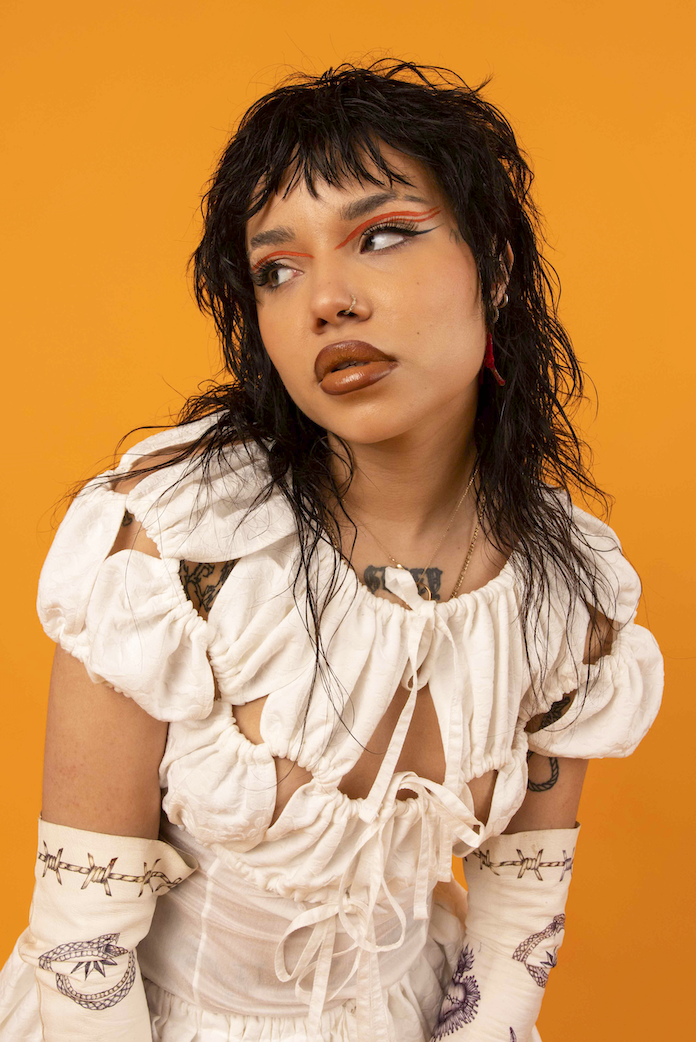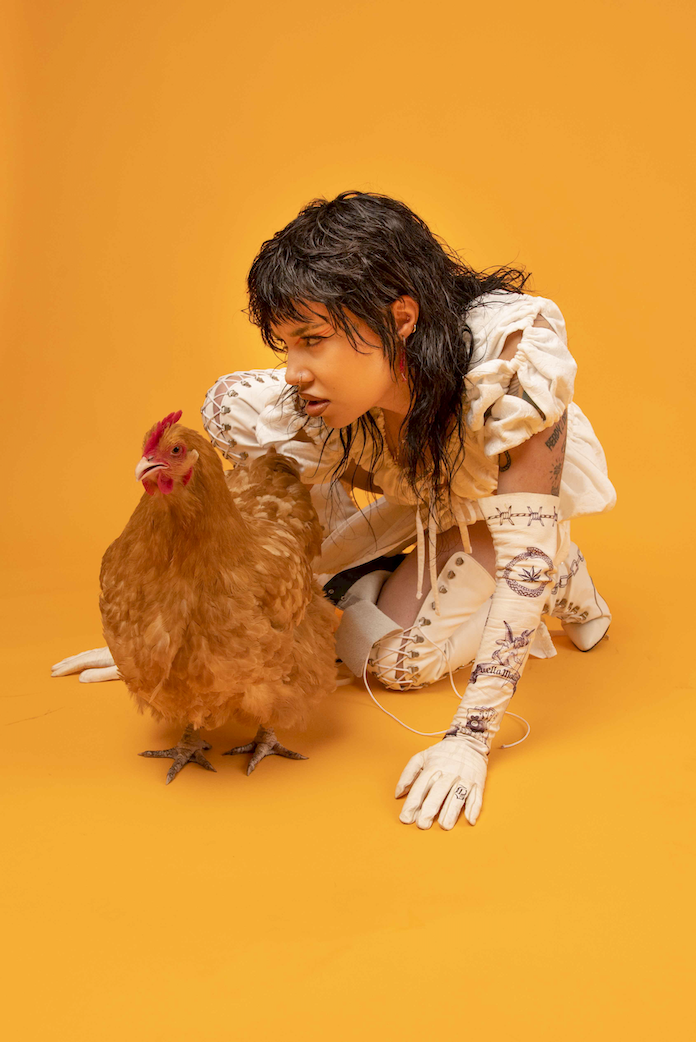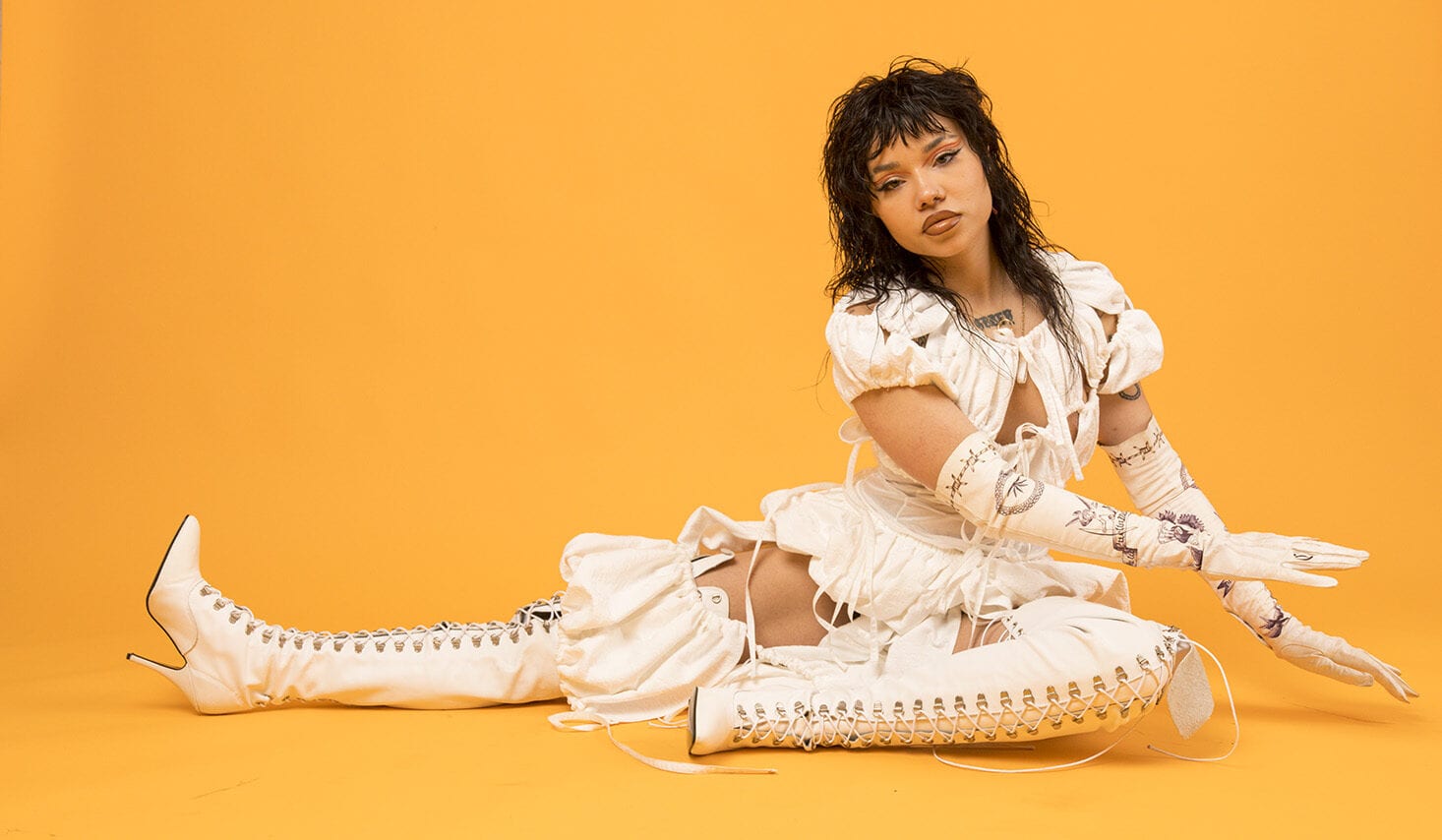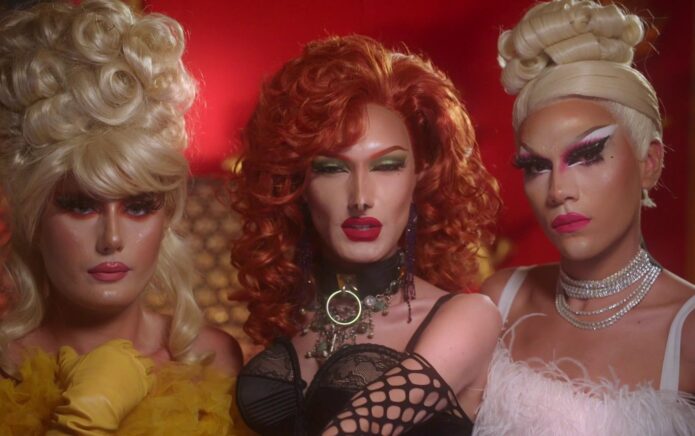
JGrrey is an industry powerhouse in the making, but she didn’t always want to be an artist. In fact, it took some convincing. “I have always been impressed by music, but I never really directly associated myself with it. It didn’t seem like something I would be able to do,” she tells GAY TIMES.
After facing some familial encouragement, the star got stuck in the industry and quickly cultivated a committed fanbase for her diaristic lyrics and neo-soul sound. Since then, JGrrey has toured with Billie Eilish, played at Glastonbury, and inspired a wave of new listeners. The unstoppable London-based artist has come a long way since her Ready 2 Die days — and she’s just getting started.
GAY TIMES caught up with the singer over Zoom to talk about her break into the music scene, how she navigated her personality, and why she hopes speaking out about her identity will help her fans.
How did you come up with your stage name?
JGrrey was just an Instagram name. I didn’t plan on it ever becoming a stage name or anything. I needed an Instagram handle and JGrrey with one ‘r’ was taken, and then I started doing the music and it just stuck.
You said before you didn’t want to be an artist right away. How did you get involved in the industry?
I’d always been a fan of music; I’d always been a fan of musicians and singers and the art of performance. It seemed very unlike me. Then one day, my friend asked me to sing on a track because I could hold a note or whatever and I hated how the outcome sounded. I thought to myself, ‘Well, I can do better than that’. So, the beginning came from me hearing myself and being aware I could do better. As I got older and my love for music grew fonder and I was finding myself more and more inspired by musicians or performers, I stumbled across Erykah Badu, Esther Phillips or Sade and Lauryn Hill, and they were my go-to.
You’ve toured with Billie Eilish and pull off some incredible sets of your own. How does it feel to watch your musical profile continue to grow?
It always comes as a surprise, no matter how frequently it happens. For me, personally, if I get to a point where I’m expected to gain recognition or expected to be played by Billie, it’s always very humbling and I’m always very grateful. It reminds me why I’m trying to carve out a space for JGrrey.


What’s some advice you would share with a younger JGrrey?
Had I known what I know today, I would have used JGrrey to carve out a cooler persona or something completely the opposite of myself. With JGrrey and the music I make, everything comes directly from me. It’s directly things I’m dealing with like the thoughts I have, the things I’ve been through, or an ex-boyfriend I hate. So, it’s not a persona, I wish it was. My friend died at the beginning of 2020, one of my closest friends and he used to have a saying, ‘Every day is an audition’. When he passed, I started to realize that I could use JGrrey to get away with anything I like. Whereas before, I’d just be wearing what Jennifer would wear. Whereas, now, I’m pushing her aesthetic because I can.
Your single Down is out now. It’s a great track. Can you break down the meaning of the song?
It’s a funny one actually. Down was written as I was trying to navigate my feelings around my sexuality. The chorus is: “Whatever it is, you know that I’m down.” It’s a moment of being okay and praising my sexuality, as opposed to feeling like I’ve got to be a certain person. I haven’t made music like that before and it was quite a freeing moment of making a song and doing what the fuck you like.
You’ve recently chosen to come out and talk to GAY TIMES about your sexuality. What led to that decision?
As someone who has struggled with their identity, it’s important to take a moment to address my experience so it makes it easier for someone else. It’s hard and it’s draining. Not everyone should have to go through that. I found a lot of power and strength in my struggles and it ties back to my friend James, who died at the beginning of 2020. He was gay. I remember him coming out to me. I remember him coming out to his parents and seeing him grow up into who he is with such confidence, and so unapologetically. When you start to see yourself honestly, which I’m starting to now, you can navigate spaces unapologetically and you can articulate yourself a lot better. I’m still learning but I’ve definitely found my people.
Did you feel represented or seen in the music industry as a queer person?
Growing up no, not at all, and that’s why I did decide to speak up now because there’s strength in numbers. With people such as Arlo Parks or Munroe Bergdorf, HARVE, Karnage Kills or even Bimini [Bon Boulash] — there are so many artists I’m in awe of. You don’t look at how they identify or their sexuality because it’s not who they are. Their art is who they are and however they choose to be represented is a bonus. Whereas when I was younger, I feel like sexuality was a massive part of the way someone’s branded. I value and appreciate people such as Monroe, Karnage Kills or Bimini. You can’t question when someone is organically themselves and trying to be the best version of themselves. As soon as you are around that organic energy, you think ‘Wow, this is so refreshing’ and that inspires others to do the same. I grew up in foster homes. It’s a massive part of my childhood and even my Instagram bio is “I do not identify”. I don’t know who my family is, where I come from, or what parts of my personality are made by others. So, when you start to be more honest about even your lack of identity then you’re starting a conversation in the direction of growth.

With your music, do you like to keep the subject vague so any of your listeners can relate to the track?
Yeah, 100 percent! People won’t know that a lot of my songs are about girls. I think it’ll blow some minds, but Dreaming Fool is about a girl. Don’t Fade is about a girl and she doesn’t know it’s about her and that’s so crazy. It’s also with pronouns too. I’ve got a song called Theirs which isn’t out yet, but it’s about using they/them pronouns. For me, keeping songs as fluid as possible with regards to gender and being ambiguous is something I liked to do, even before I came out. I never want to close anyone off from listening to my music. I would never want someone to hear a song of mine and feel like it doesn’t apply to them or their situation just because of the way I sang ‘their’ or ‘she’.
What’s been your favourite fan-related moment?
One night I was playing a show and I had drinks with a lot of the girls after. Because I was aware that a lot of them had made fan accounts for me and they were at the front of the stage and gave it so much energy. Two of the girls had recently got married and one of them proposed while listening to my music and that was amazing. We had a massive conversation about how great it is to be queer. It was this really nice moment. It was one o’clock in the morning and I was outside this venue with girls, guys, and non-binary and non-gender conforming fans. It was fab. I remember thinking, ‘Wow, I would never have expected this from my music.’ I had this whole community of people joking, laughing and being brought together by their common ground in queerness.
What’s your favourite thing about your queerness?
It’s the journey. I’m quite new to learning certain things within the community. I’m aware that everyone’s journey is different. Nonetheless, I think it’s made me the person I am today and I know that applies to a lot of my queer friends as well, and I think that unites me and so many other people and I love it.
